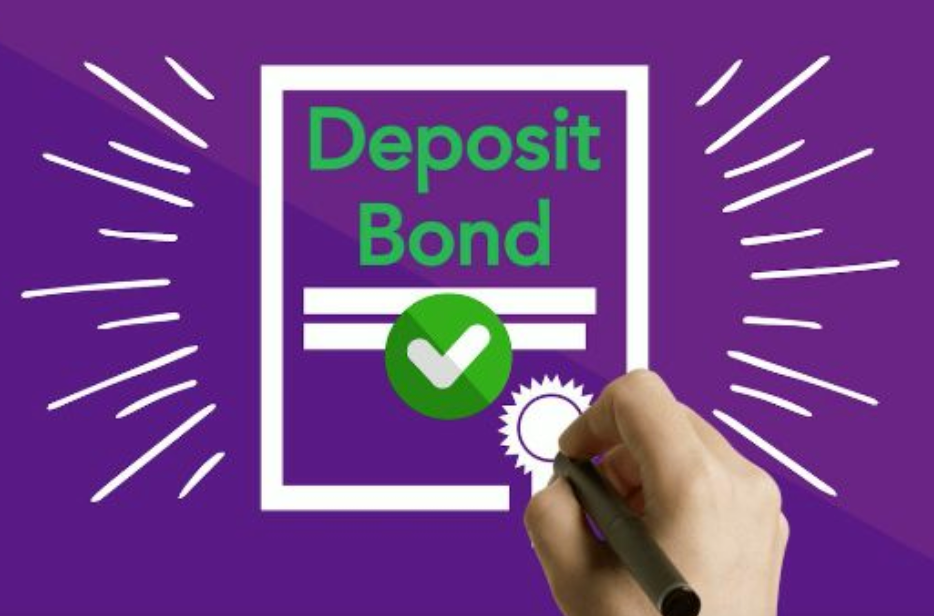
The process of purchasing a home is both exciting and complex, requiring cautious planning and financial preparation as well as thorough consultation with mortgage brokers or financial advisors. The payment of a deposit, which serves as a guarantee to the seller that the buyer is committed to the transaction, is an essential aspect of purchasing property.
However, not everyone has the cash necessary to pay the retainer in advance. In this situation, deposit bonds are a viable alternative.
This article will delve into the specifics of a deposit bond, including how they function, their advantages when purchasing a property, and the deposit bond’s cost.
What is a deposit bond?
A deposit bond is a form of financial instrument used in lieu of a cash down payment when purchasing real estate. It is essentially a guarantee to the vendor that the required deposit amount will be paid at the closing of the property transaction.
Instead of a cash pledge in residential, commercial, and industrial property transactions, a deposit bond are typically issued by insurance companies or financial institutions.
How much does a deposit bond cost and how does it work?
A deposit bond works on residential or commercial property purchases and functions by assuring the vendor that the buyer will pay the required deposit at the closing of the property transaction.
The buyer obtains a deposit bond from a reputable issuer like deposit power by paying a premium equivalent to a percentage of the deposit amount. There is a deposit bond application process you need to follow.
The bond issuer is given all the relevant information such as the full purchase price, conditional finance approval, lending institution, contract of sale or contract terms.
A deposit bond fee is then paid and a deposit bond certificate is issued for the deposit bond amount.
The deposit bond is then provided as a guarantee to the seller, and the buyer is typically required to pay the complete deposit amount to the seller at the closing of the property transaction.

How long does a deposit bond approval take?
The approval period for a deposit bond can vary based on the complexity of the transaction and the issuer.
In most cases, certification of a deposit bond can be obtained within a few business days once the deposit bond fee has been paid, but it is advisable to allow for additional time in the event of unforeseen delays.
It is essential to register for a deposit bond well in advance of the property settlement date to ensure that it will be available on time.
Why would a vendor not accept a deposit bond?
In some instances, a vendor may not accept a deposit bond, despite the fact that deposit bonds are a practical option for buyers who might not have a cash deposit. Among the reasons a vendor might refuse a commitment bond are the following:
Some vendors may not accept deposit bonds or may prefer a cash deposit because it provides immediate access to funds and eliminates any associated risks with a deposit bond. They will generally communicate this to the real estate agent to convey to interested parties.
Lack of confidence in the issuer:
Sellers may be wary of deposit bonds issued by less reputable or unfamiliar issuers, as they may not have the same level of confidence as they would with a monetary deposit from a well-known financial institution or insurance company.
Certain vendors’ terms and conditions may prohibit the use of deposit bonds, such as stipulations or restrictions on the use of a deposit bond.
Before proceeding with a property transaction involving a deposit bond, it is imperative to discuss and elucidate the acceptance of a deposit bond with the seller and their legal counsel.
Benefits of using a deposit bonds
Deposit bonds offer several advantages to purchasers of real estate. Consider some of the benefits of using a deposit bond:
Maximise interest earnings on investments
Using a deposit bond, purchasers can avoid tying up their savings in a monetary deposit, allowing them to continue earning interest on their funds.
This can be especially advantageous when the consumer has limited savings or wants to invest those savings in other opportunities, such as paying off debts with a higher interest rate or making other investments.
Maximise earned interests from savings
Using a deposit bond, purchasers can avoid tying up their savings in a monetary deposit, allowing them to continue earning interest on their funds.
This can be especially advantageous when the consumer has limited savings or wants to invest those savings in other opportunities, such as paying off debts with a higher interest rate or making other investments.
Alternative to bridging finance
In some instances, purchasers may be required to sell their current home before acquiring a new one.
This can present a financial obstacle, as the buyer may need funds for the deposit on the new property before the sale of their current home is finalised.
In such circumstances, purchasers may resort to bridging finance, which can be expensive and complicated.
However, deposit bonds can be a more convenient and economical alternative to bridging finance, as they do not require the vendor to borrow additional funds or pay interest.
Things to consider when using deposit bonds
Active bidders at multiple auctions might find it difficult to come up with monetary deposits for each auction.
Deposit bonds can be utilised at multiple auctions, allowing buyers to partake in multiple property auctions without needing to make multiple cash deposits.
This can provide greater flexibility and convenience for buyers in a competitive market who are actively exploring for properties.
Financial checks

In order to obtain a deposit bond, a buyer must pass a financial examination and satisfy certain requirements.
Typically, issuers evaluate the buyer’s financial capacity, creditworthiness, and ability to pay the settlement deposit.
It is crucial for purchasers to be aware of the financial checks and requirements of the deposit bond issuer and to ensure that they meet the necessary requirements to obtain a deposit bond.
Fees and charges involved
There are fees and charges associated with deposit bonds, including an advance premium payment to the issuer.
The premium is typically a percentage of the initial deposit and can vary based on the issuer and the particulars of the property transaction.
When contemplating this option, buyers must carefully consider the fees and charges associated with deposit bonds and factor them into their overall budget and financial planning.
Alternatives to deposit bonds

Although deposit bonds can be a practical option for buyers, there may be other alternatives to consider. Let’s investigate several alternatives to a deposit bond:
Parental guarantees
If a buyer lacks sufficient savings or cannot obtain a deposit bond, he or she may contemplate obtaining a parental guarantee.
In lieu of a cash deposit, a parental guarantee consists of a parent or close relative supplying a guarantee for the deposit amount.
However, this option requires careful contemplation and consultation with legal and financial advisors, as the guarantor assumes additional risks and obligations.

Bridging loans
Bridging loans are an option for buyers who need funds for the deposit and settlement of a new property before the sale of their existing property is finalised.
Bridging loans are short-term loans that can bridge the gap between the purchase of a new property and the sale of an existing one.
However, bridge loans can be difficult and expensive due to their typically higher interest rates and fees.
Loans offering a higher LVR
If a buyer cannot obtain a deposit bond or has insufficient savings, he or she may contemplate loans with a higher loan-to-value ratio (LVR).
A loan with a higher LVR enables borrowers to acquire a larger proportion of the property’s purchase price, which can be used as a down payment.
A deposit bond can be a useful and convenient option for homebuyers who lack immediate access to funds for a down payment.
However, purchasers must carefully consider the financial checks, fees, and charges associated with deposit bonds and investigate alternative options.
We recommend you seek professional guidance or a mortgage broker and fully comprehend the terms and conditions of a deposit bond.
FAQs for Understanding Deposit Bonds
A deposit bond is a financial guarantee used in property transactions to cover the deposit amount required when purchasing a property. It acts as a substitute for a cash deposit.
A deposit bond is issued by an insurance company or a financial institution, guaranteeing that the buyer will pay the full deposit amount at settlement. The buyer pays a fee for the bond, and no cash is exchanged until the property settlement.
Deposit bonds are commonly used by home buyers, investors, and first-time buyers who may not have immediate access to cash for a deposit but will have the funds available by the settlement date.
Benefits include freeing up cash for other investments or expenses, avoiding the need to liquidate assets, and providing flexibility in timing the settlement. It also simplifies the process for buyers who may be waiting for the sale of another property.
Deposit bonds can be issued for different terms, typically ranging from a few months to up to four years, depending on the requirements of the property purchase and the issuing company’s policies.
Risks include the potential for the deposit bond issuer to deny the claim if the buyer fails to settle the property purchase, resulting in legal and financial consequences. It’s essential to understand the terms and conditions.
To apply for a deposit bond, you need to provide documentation such as identification, proof of income, details of the property purchase, and evidence of your ability to settle the purchase. The issuer will assess your application before approval.
The cost of a deposit bond varies depending on the deposit amount, the term of the bond, and the issuer’s fees. It typically involves a one-time premium payment, which is a percentage of the deposit amount.
Yes, deposit bonds can be used for both residential and commercial property purchases. However, the terms and conditions may vary, so it’s important to check with the issuer.
Not all sellers and real estate agents accept deposit bonds, so it’s important to confirm their acceptance before proceeding. Some sellers may prefer a cash deposit, especially in a competitive market.

TORI DUNLAP
Tori is a finance blogger and researcher at OurTop10.com.au, where she enjoys helping people navigate the world of finance and money. Through her insightful articles and comprehensive research, she empowers readers with valuable knowledge on budgeting, saving, investing, and retirement planning.
Tori’s approachable and empathetic style makes complex financial concepts relatable and easier to understand, She aims to foster a sense of community and leave a lasting, positive impact on her audience’s financial well-being.
